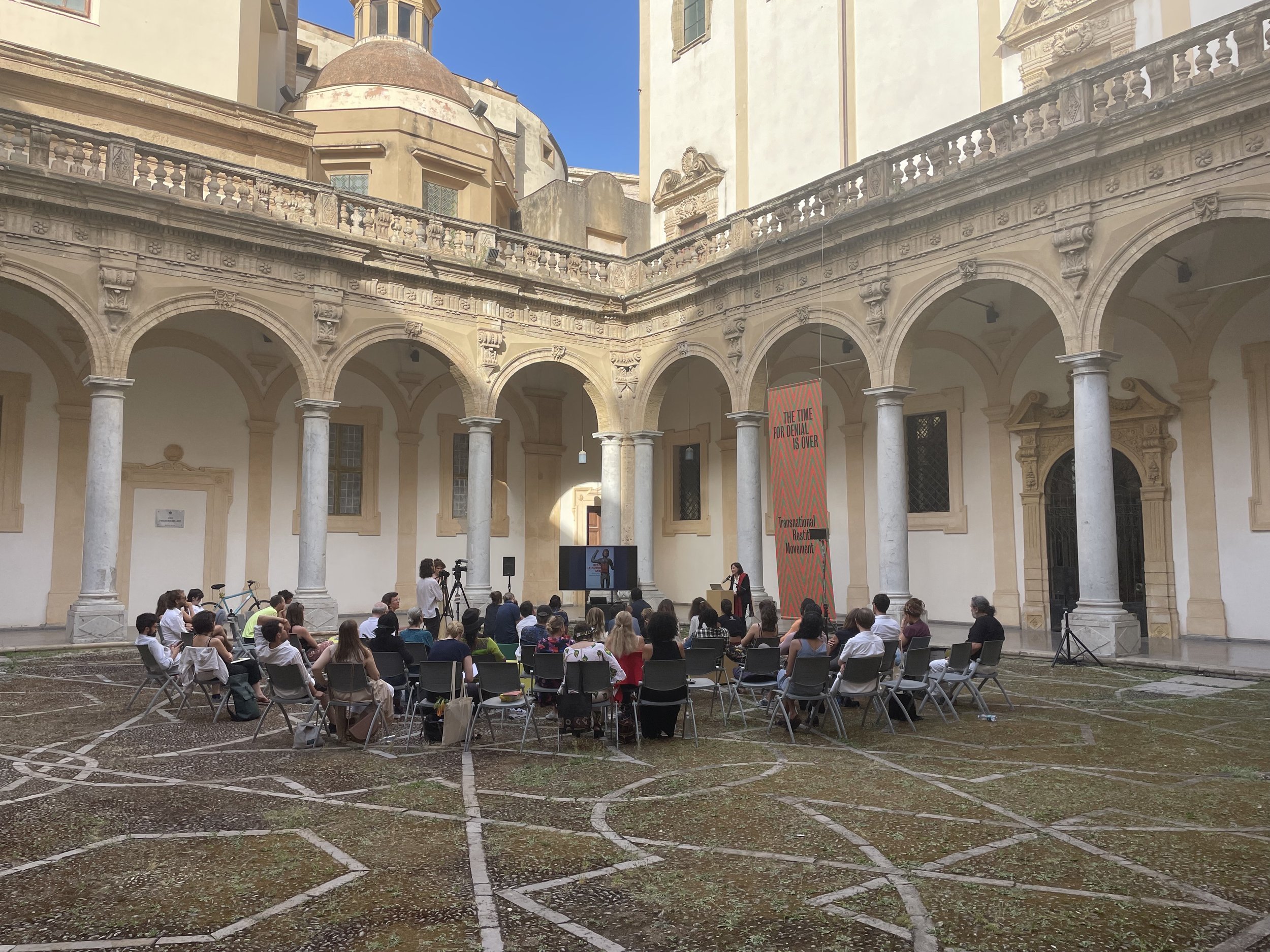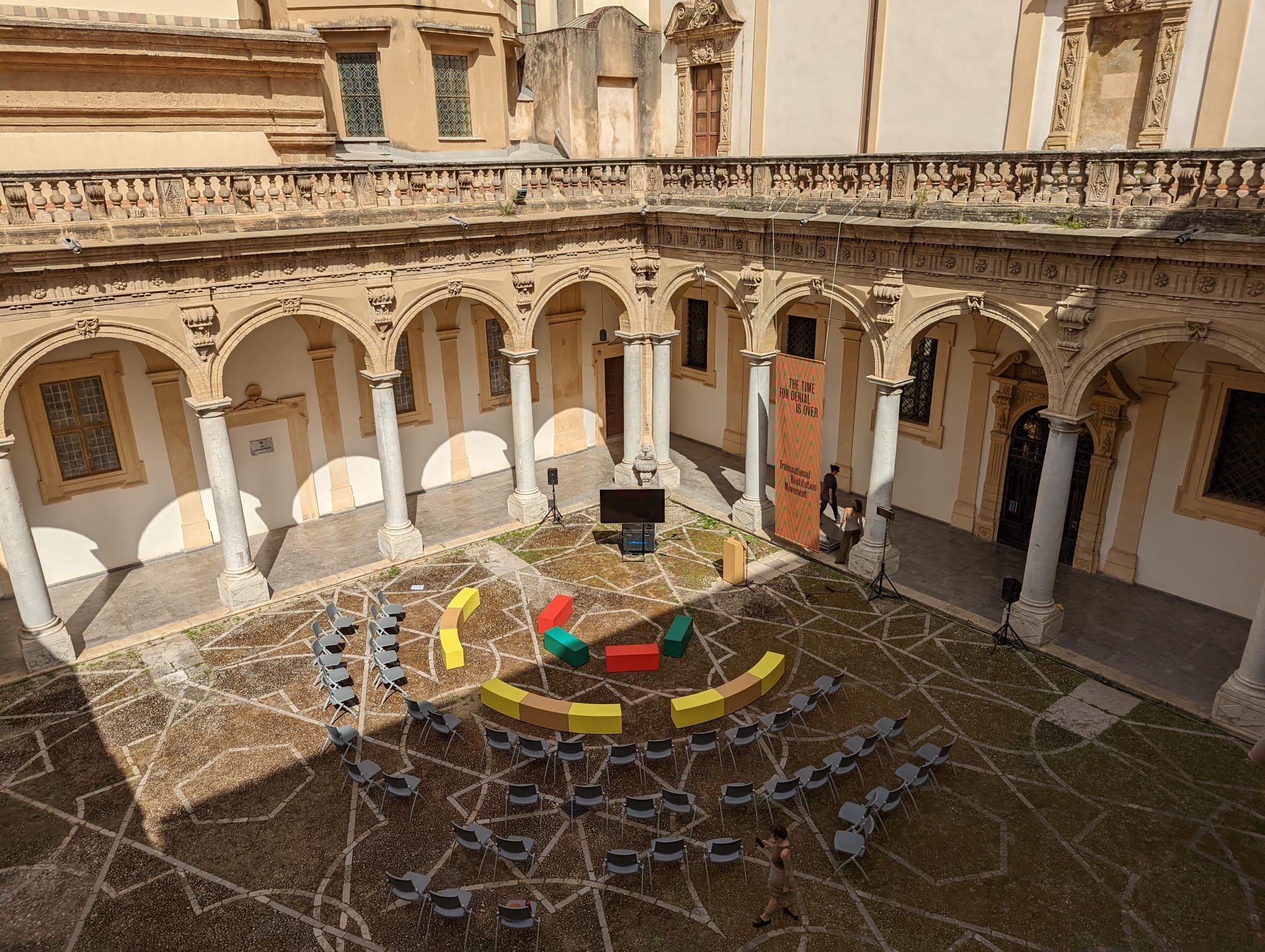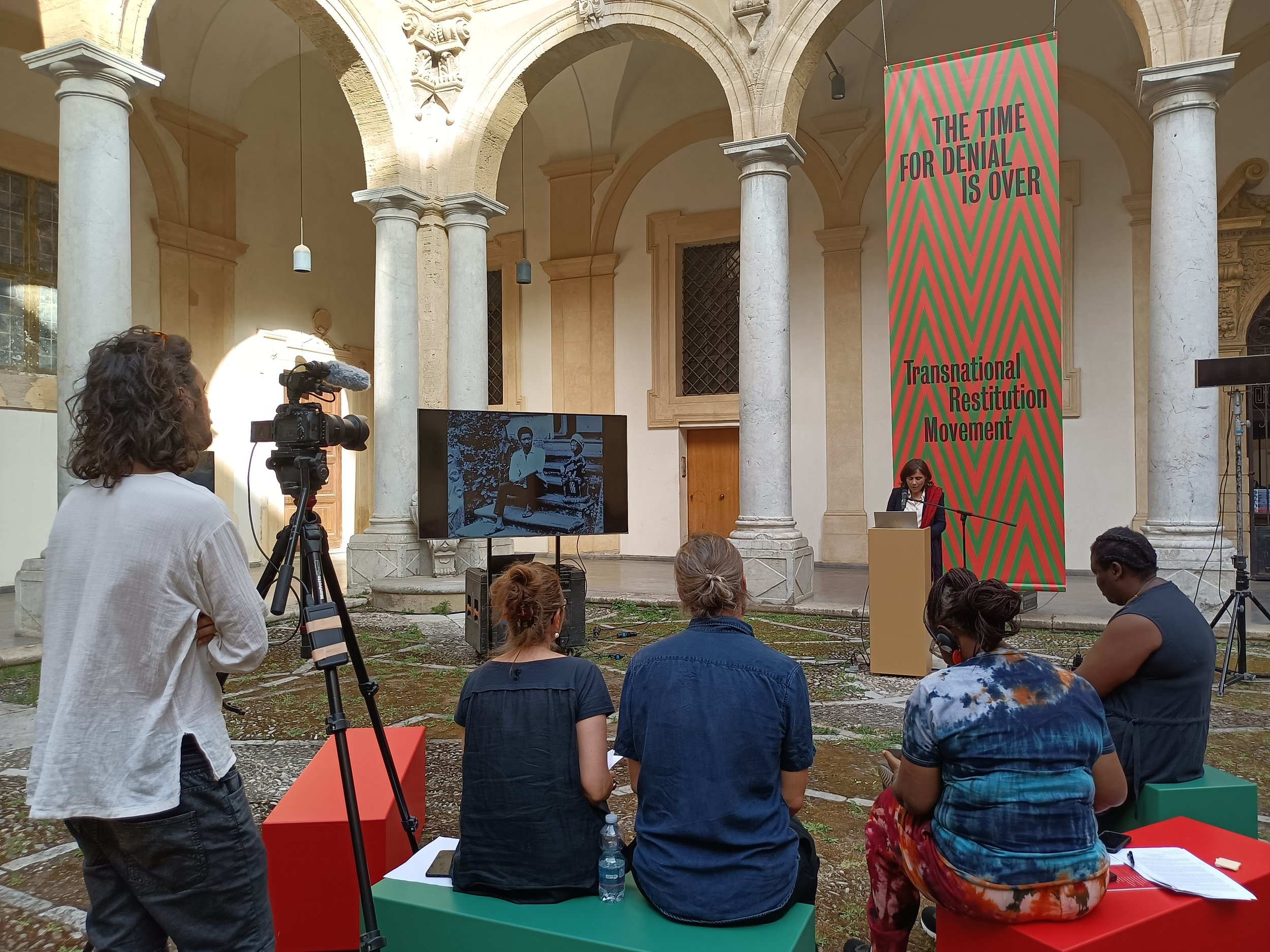The Time For Denial Is Over - Palerme
Mouvement de restitution transnationale
organisé par Studio Rizoma et GROUP50:50
Avec la restitution récente des bronzes du Bénin par les deux musées européens possédant les plus grandes collections d'art africain, il est devenu irréfutable que nous sommes entrés dans une nouvelle ère du débat postcolonial. Dans ce contexte, le GROUP50:50 et le Studio Rizoma invitent des artistes, des activistes et des penseurs d'Europe et d'Afrique à jeter les bases d'un vaste mouvement de restitution transnationale. En organisant une série de conférences, de pièces artistiques et d'interventions, nous voulons présenter et discuter de pratiques artistiques et politiques qui permettront de redéfinir les identités africaines et européennes et de recadrer le dialogue et la coopération transcontinentale.
Depuis les années 1960, tout un mouvement d'artistes, d'intellectuels et d'activistes du monde entiern'a cessé de faire campagne pour la restitution d'artefacts culturels et de restes humains africains afin de faire avancer le processus de décolonisation consécutif àl'indépendance. Après une longue période de stagnation, le débat s'est accéléré ces dernières années, avec des exemples de restitution physique comme les trésors de Behanzin à la République du Bénin ou les bronzes du Bénin au Nigeria. Si la restitution réelle estdécidée au plus haut niveau diplomatique et retardée le plus longtemps possible, il appartientaux artistes et à la société civile d'accélérer et d'accompagner ce processus. Le temps est venu de suivre ceux qui ont ouvert la voie à un mouvement d’une ampleurtransnationale. Comment redonnerà ces objets leur signification symbolique, sociale et historique ? Comment les relier aux contextes contemporains de production de connaissances et d'interaction sociale ?
Dès que l'on quitte la perspective européenne, les crânes et les squelettes deviennent plus que des objets scientifiques et les masques plus que des objets d'art. Ils sont habités par des esprits ancestraux brutalement retirés de leur habitat, enfermés dans des collections oubliées et ils continuent de hanter le continent européen. Pour accompagner le processus de restitution, nous devons apprendre, en Europe comme dans les anciennes colonies, à entrer en dialogue pour aborder la longue histoire des violences physiques, de l’exploitation économique, de l’aliénation, de l’appropriation culturelle et de la dislocation de ces objets porteurs de sens. Quels rituels pouvons-nous inventer pour accompagner le retour de ces objets ? Comment inverser le processus d'aliénation induit par une pensée hégémonique euro-centrée et imposée par la violence coloniale ?
La déstabilisation des structures sociales par l'expropriation d'objets ayant soit une valeur culturelle soit un pouvoir symbolique a permis l'exploitation des hommes et de la nature. Les idées modernistes de progrès et la séparation consécutive des sociétés en sociétés dites «avancées» ou «primitives», l'impératif de la croissance économique liée à l’idée selon laquelle les ressources naturelles seraient disponibles en quantité illimitée ont annihilé toute cosmologie alternative permettant de définir différemment la relation des humains avec la nature. Le mouvement de restitution doit-il réclamer également la restitution des ressources naturelles ? Et qui paie pour la destruction des environnements et des habitats causée de l'exploitation continuelle des ressources naturelles ? Et ne serait-il pas préférable pour l'humanité que des cosmologies alternatives puissent lui être restituées ?
GROUP50:50 et Studio Rizoma invitent des artistes, des activistes et des penseurs*euses d’Europe et d'Afrique qui représentent l'avant-garde d'un mouvement de restitution transnationale à présenter et à discuter de leurs pratiques. Après la première étape àPalerme, les protagonistes du «Mouvement de restitution transnationale» se rendront à Leipzig, Lubumbashi, Kinshasa et Berlin en 2022 et 2023. Dans chaque ville, ils impliqueront des artistes* et des activistes*locaux dans leurs réflexions et leur production artistique pour faire avancer le mouvement de restitution transnationale.
«The Time For Denial Is Over» est un projet duGROUP50:50 (Bâle-Lubumbashi), du studio rizoma (Palermo), du Centre d'Art Waza (Lubumbashi) et d’European Alternatives, en collaboration avec PODIUM Esslingen, The European Pavilion, CTM Festival Berlin, euro-scene Leipzig, Kaserne Basel et Vorarlberger Landestheater.
Après l'événement d'ouverture à Palerme, "The Time For Denial Is Over" voyage à Bâle, Bregenz, Leipzig, Berlin, Kinshasa et Lubumbashi.
FIRST SESSION: The Arduous Transformation of Institutions
The European and African museums and the political institutions that decide on restitution are changing very slowly. Hegemonic ideas have been deposited in layers, and structural inequalities continue to reproduce today. How can we contribute to their transformation from inside and outside the institutions? Moderated by: Emmanuelle Spiesse
Lesson#1 Parlons des Mensonges Institutionnels – Bénédicte Savoy, Art Historian, Berlin
Bénédicte Savoy has shaped the restitution debate of recent decades. Together with the Senegalese author Felwine Sarr, she wrote a revealing and groundbreaking report on the restitution of cultural heritage commissioned by the French President Emmanuel Macron.
Lesson#2 Dealing with a Fragmented Heritage – Peju Layiwola, Visual Artist, Lagos
Peju Layiwola is an artist and professor of art history. Her work focuses on the looting and restitution of cultural heritage from the Kingdom of Benin (Nigeria) and memory culture, voids, and postcolonial continuities. She is the curator of various exhibitions, including I MISS YOU, at Rautenstrauch Joest Museum, Cologne, that prepares the restitution of 96 objects from the museum's collection to Nigeria.
Lesson#3 Continuous Repositioning – Leone Contini, Artist and Anthropologist, Rome
The artist and anthropologist Leone Contini has worked extensively on the colonial traces scattered in the deposits and archives of Italian museums, amongst others in the former Colonial Museum in Rome, now Museo delle Civiltà, as well as in the archives of his family who lived in Libya, where his grandfather worked as an archaeologist.
Lesson#4 Radical Education – Sepake Angiama, Curator and Educator, London
Sepake Angiama has developed educational programmes for various institutions, including Tate Modern, documenta 14 and Manifesta12. She is the artistic director of the Institute of International Visual Arts (Iniva), dedicated to developing artistic research, collective study, publishing and commissioning that reflects on the social and political impact of globalisation.
Screening – You Hide Me – Nii Kwate Owoo
In 1970, the Ghanaian filmmaker Nii Kwate Owoo spent a day filming in the basement archives of the British Museum. In 1971, his film You Hide Me was banned in Ghana for being “anti-British”, ironically resulting in a headline published by the influential London-based magazine West Africa that announced the film to the rest of the world. More than half a century later, You Hide Me was awarded the Best Documentary Prize at the Paris Short Film Festival 2020.
Talk Series – SECOND SESSION: Speak to the Dead and the Spirits!
When anthropologists, doctors and warlords passed on African masks and ritual objects, skulls and skeletons to European museums, they robbed these objects of their spiritual meaning. The relationship between humans, the spirits of ancestors and nature was declared superstition. How can we rediscover the relationship between humans and spirits? Moderated by: Eva-Maria Bertschy
Lesson#5 Qui est le Voleur ? – Mwazulu Diyabanza, Political Activist, Paris
In 2020, Congolese activist Mwazulu Diyabanza tried to steal objects from European museums and bring them back to his country. The trial against him was highly publicised in Europe. As a result, he founded the Multicultural Front Against Pillaging to unite the world's indigenous peoples to recover their looted heritage.
Lesson#6 Revisit the Past of Beauty – Christian Nyampeta, Visual Artist, London
In Christian Nyampeta’s film Sometimes it was Beautiful, the spirits of several postcolonial luminaries, a filmmaker, and a high ranking royal of a former colonial empire talk about the “traces of a history that is filled with pain” and the “balance of composition”. The film was, among other places, presented at The Solomon R. Guggenheim Museum in New York.
Lesson#7 Returning the Dead as Humans and Citizens – Ciraj Rassool, Historian, Cape Town
Ciraj Rassool is a Professor of History at the University of the Western Cape, Cape Town and has written many influential books on Africa's cultural heritage. He explores how human remains in European museums can be returned and what rituals are used to restore their humanity.
Lesson#8 A Visit of the Mbuti People – Patrick Mudekereza, Curator, Lubumbashi
Patrick Mudekereza, artistic director of Centre d’Art Waza, travelled with GROUP50:50 to the equatorial forest to visit the nomadic Mbuti people. Their music theatre production tells the story of seven "pygmy skeletons" brought to Geneva by a Swiss doctor in the 1950s, a tale of exhumation and displacement.
Lesson#9 The Unburied of the Cimitero Dei Rotoli – Caterina Pasqualino, Anthropologist and Filmmaker, Palermo / Paris
In her current project, the Palermitan anthropologist and filmmaker Caterina Pasqualino focuses on the scandal of the unburied in the Cimitero di Santa Maria dei Rotoli. She takes this as an opportunity to talk to Palermitans from different communities about their funeral rituals and their relationship to the dead.
Screening – Return: An Epic Journey – Rita Mukebu
Inspired by the African masks in the Rietberg Museum in Zurich, the Swiss artist Lukas Stucky designed a mask and asked the Congolese artist Rita Mukebo to give it the status of an artwork. In a short film produced by Centre d’Art Waza Lubumbashi, Mukebu tests the relevance of the mask by visiting the Tshokwe community, the art museum director, a university professor, and others.
Return: An Epic Journey. Directed by Rita Mukebu. Produced by Centre d’Art Waza, Lubumbashi, 2021. 15 min.
Screening – Sometimes It Was Beautiful – Christian Nyampeta
A film by artist Christian Nyampeta, about a meeting between improbable friends, gathered to watch I fetischmannens spår (In the Footsteps of the Witch Doctor), one of the six Swedish films cinematographer Sven Nykvist made in or about Congo between 1948 and 1952.
Sometimes It Was Beautiful. Directed by Christian Nyampeta, Stockholm, 2018. 38 min.
Talk Series – THIRD SESSION: Colonial Ghosts and Future Landscapes
Colonial history has been imprinted in the landscapes, both in the colonised South and the ruling North. We find hybrid landscapes inhabited by the ghosts of past crimes between devastated mining regions and highly developed oases of prosperity. What will we leave behind in the topography of the future? How can we imagine the restitution of habitats that are being destroyed? Moderated by: Lorenzo Marsili
Lesson#11 Abandoning and Re-connecting Heritage – Emilio Distretti, researcher, writer and educator, London / Basel
Emilio Distretti is a Postdoctoral Fellow in the History and Theory of Architecture and Urbanism at the University of Basel. His research and pedagogy take on interrelated avenues on critical re-use of colonial architectural heritage, reparative justice and decolonial politics in the Mediterranean (Italy, North Africa and the Levant) and in the Horn of Africa.
Lesson#12 Solanum Aethiopicum – Aterraterra, Artist and Farmer Collective, Palermo
Fabio Aranzulla and Luca Cinquemani of the Palermo-based collective Aterraterra have cultivated an eggplant species that arrived in Italy from Ethiopia during colonial times, now fully part of Italy’s cultural heritage. They tell a transnational story between biodiversity, neocolonialism and identitarian narrations.
Lesson#13 Who Owns the Forest? – Remy Zahiga, Climate Activist and Indigenous People Rights Advocate, Bukavu
Remy Zahiga is a Congolese youth and climate activist who has made it his mission to preserve the rainforest in the Congo Basin and fights for the rights of its indigenous communities, such as the Mbuti people. He advocates for recognising indigenous knowledge to find a climate-friendly way of dealing with nature.
Lesson#14 Past and Present Slaves – Alagie Jinkang, Researcher, Palermo
Alagie Jinkang's research examines the exploitative conditions of the Senegambian communities who harvest olives in the Italian fields and live in the so-called ghetto of Campobello di Mazara. He makes a challenging comparison with historical forms of slavery.
Lesson#15 Natural Heritage – Evelyn Acham, Climate Activist, Kampala
Evelyn Acham is one of the most heard voices of the Fridays for Future movement in Africa and the national coordinator of the Rise Up Movement founded by Vanessa Nakate. She fights for preserving future habitats and a radical shift in economic and development policies.
Screening – Il Corno Mancante – Leone Contini
During the Second World War, the ethnographic collections in Milan were bombed – and with them a Sino-Tibetan sculpture. The missing parts of the statue were buried in an artificial hill created from the debris of the bombing. Years later, plants, animals and people reoccupy the sterile debris dump. In Leone Contini’s film Il Corno Mancante which was partly shot in Palermo, the sculpture's missing horn is buried with several ritual acts.
Il Corno Mancante. Directed by Leone Contini, Milano, 2017 / 2018. 25 min.
Screening – Terra Inquieta – Chiara Ambrosio and Caterina Pasqualino
Chiara Ambrosio and Caterina Pasqualino‘s film Tierra Inquieta portrays a group of neighbours from a working-class district of Granada, Spain. After the 2008 financial crisis, they transformed a dumping ground into an orchard – a physical manifestation of resistance, only a few kilometres from the mass graves of the Spanish Civil War, and where Garcia Lorca was murdered.
Terra Inquieta. Directed by Chiara Ambrosio and Caterina Pasqualino, Granada, 2017. 64 min.
Programme
avec
Bénédicte Savoy
historienne de l'art, Berlin
Mwazulu Diyabanza,
activiste politique, Paris
Peju Layiwola
artiste visuelle, Lagos
Leone Contini
artiste et anthropologue. Rome
Sepake Angiama
curateur et éducateur, Londres
Rete Anticolonale
collectif d'artistes et d'activistes, Palerme
Christian Nyampeta
artiste visuel, Londres
Hervé Youmbi
artiste plasticien, Douala
Rita Mukebu
artiste visuelle, Lubumbashi
Ciraj Rassool
historien, Cape Town
Patrick Mudekereza
curateur et auteur,Lubumbashi
Caterina Pasqualino
anthropologue et cinéaste, Palerme/Paris
Huguette Tolinga
percussionniste, Kinshasa
Christiana Tabaro et Michael Disanka
metteurs en scène, Kinshasa
Elia Rediger
artist, chanteur et compositeur, Bâle
Kojack Kossakamvwe
guitariste et compositeur, Kinshasa
Ruth Kemna
altiste et performeuse, Palerme
Emilio Distretti
chercheur et éducateur, Londres/Bâle
Aterraterra
collectif d'artistes et d'agriculteurs, Palerme
Remy Zahiga
activiste climatique, Bukavu
Alagie Jinkang
chercheur, Palerme
Evelyn Acham
activiste climatique, Kampala
Lord Spikeheart (DUMA)
musicien, Nairobi
Ecko Bazz & STILL
musiciens, Kampala et Milano
...et d’autres
organisé par
Patrick Mudekereza
Eva-Maria Bertschy
avec des contributions de
Giorgio Mega
Emmanuelle Spiesse (LAM, Les Afriques dans le monde, laboratoire CNRS)
Production management
Letizia Gullo
Giorgio Mega
Pamina Rottok
General management
Marta Cillero
Set Design and production
Jesse Gagliardi
Technical direction and service
Sinergie Group
Video production and documentation
La Bandita Film
Institutional relations
Patrizia Pozzo
Public relations in art and culture
Sofia Li Pira
Communication and Creative Direction
Izabela Anna Moren
Editorial assistant
Elisa Capellini
Graphic Design
Simone Capano
Luca Pantorno
Social media
Elena Fortunati







